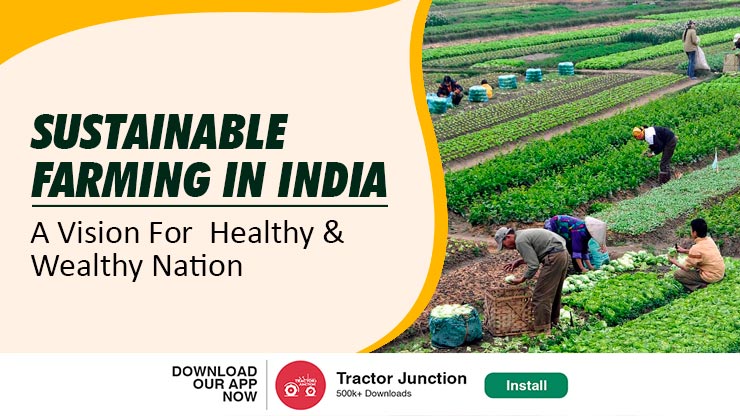Sustainable agriculture in India is a critical need due to the country’s large population, the majority of which relies on agriculture for their livelihoods. Sustainable agriculture aims to meet the current agricultural needs without compromising the ability of future generations to meet their own needs. In India, this involves addressing various challenges related to resource management, environmental conservation, and socio-economic factors. Here are some key aspects of sustainable agriculture in India:
- Diversification of Crops: Promoting crop diversification by encouraging farmers to cultivate a variety of crops rather than relying on monoculture not only enhances soil health but also reduces the risk of crop failures due to pests and diseases.
- Organic Farming: The adoption of organic farming practices is growing in India. Organic farming reduces the use of synthetic pesticides and fertilizers, emphasizing the use of organic matter, crop rotation, and biopesticides.
- Water Management: Sustainable agriculture requires efficient water management practices, especially in a country like India, where water resources are often scarce. Techniques like drip irrigation and rainwater harvesting help conserve water.
- Soil Health: Maintaining soil fertility and health is crucial. This involves practices such as no-till farming, using organic compost, and reducing soil erosion through methods like contour farming.
- Agroforestry: Integrating trees and shrubs with crops (agroforestry) can provide multiple benefits, including improved soil fertility, increased biodiversity, and additional income for farmers through timber and fruit production.
- Crop Rotation: Crop rotation helps break the life cycle of pests and diseases, reduce the need for chemical inputs, and improve soil fertility. Traditional practices like mixed cropping are also being revived.
- Sustainable Livestock Farming: Sustainable agriculture isn’t limited to crops; it also includes sustainable livestock farming. Practices such as organic and free-range livestock rearing reduce the environmental impact of animal agriculture.
- Promoting Indigenous and Local Varieties: Encouraging farmers to cultivate indigenous and local crop varieties can help preserve genetic diversity and reduce dependence on a few high-yielding but resource-intensive crop varieties.
- Government Initiatives: The Indian government has launched various initiatives to promote sustainable agriculture, such as the National Mission for Sustainable Agriculture (NMSA) and Paramparagat Krishi Vikas Yojana (PKVY), which focuses on organic farming.
- Capacity Building: Providing training and education to farmers on sustainable agricultural practices is essential for successful adoption.
- Market Access: Ensuring that sustainable agriculture practices lead to fair market access and prices for farmers is crucial. Farmer producer organizations (FPOs) and e-commerce platforms are helping connect farmers to markets directly.
- Research and Innovation: Investing in research and innovation in agriculture is essential for developing and disseminating sustainable practices and technologies.
- Climate-Resilient Agriculture: Given the increasing challenges posed by climate change, promoting climate-resilient agriculture practices, such as drought-resistant crops and improved weather forecasting, is crucial.
Sustainable agriculture in India is a multifaceted challenge that involves not only agricultural practices but also policy support, education, and the involvement of various stakeholders, including farmers, government agencies, and non-governmental organizations. It’s seen as a critical pathway to address food security, reduce the environmental impact of agriculture, and improve the livelihoods of millions of farmers in India.



